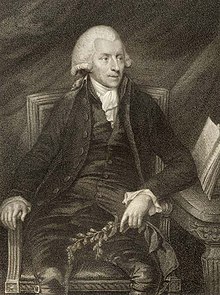William Withering
William Withering (born March 28, 1741 in Wellington, Shropshire , † October 6, 1799 in Larches near Birmingham ) was a British botanist and doctor. He discovered the medicinal effects of digitalis glycosides . Its official botanical author abbreviation is “ With. "
Life
William Withering, the son of a pharmacist, studied medicine at the University of Edinburgh from 1762 to 1767 , and then worked as a country doctor in Stafford, then in Birmingham, where he made a name for himself as a doctor and scholar from 1775, and at the Birmingham General from 1779 Hospital . According to his own testimony, he became aware of the therapeutic effect of foxglove in "dropsy" (German also Gewebswassersucht , Engl. Dropsy ) when he was asked in 1775 for his opinion on a home remedy that an old herbalist woman successfully used for this disease . Withering found out that the only active substance in the recipe was the red foxglove leaves ( Digitalis purpurea ), which were prepared as an infusion . From 1775 to 1784 Withering systematically examined the diuretic (urinary flow-increasing) effectiveness of the ingredients of various parts of the foxglove plant in over 160 patients with different forms of dropsy. These exemplary careful, unbiased and systematic therapeutic studies make Withering the founder of modern clinical pharmacology and evidence-based medicine. He was the first to make a clear distinction between therapeutic (diuresis) and toxic (vomiting, diarrhea, visual disturbances) doses of digitalis. He also noticed that the herbal toxin accumulated in the patient's body because the effect increased when administered over a longer period of time. However, Withering has not yet recognized the connection between the diuretic effect of digitalis and its effect on heart function. He localized the main effect in the kidneys, even though he was aware of the effects of digitalis on the heart rate. Later research has confirmed many of Withering's conclusions.
In addition to his medical work, Withering published a book on British flora, which was printed in many editions. He also did pioneering work in the identification of mushrooms .
Honors
He discovered the barium mineral Witherite, named after him .
In 1785 he was elected as a member ("Fellow") in the Royal Society .
After him, the genus Witheringia is L'Hér. named from the nightshade family (Solanaceae).
Works
- A botanical arrangement of all the vegetables naturally growing in Great Britain . 1776 (numerous other editions with changing titles).
- An account of the foxglove, and some of its medical uses: with practical remarks on dropsy, and other diseases . Birmingham 1785 (digitized version)
- Christian Friedrich Michaelis (translator). Wilhelm Withering's treatise on the red thimble and its application in practical medicine, especially in dropsy and some other diseases. JG Müller, Leipzig 1786 (digitized) (digitized)
swell
- Christoph Gradmann : Withering, William. In: Werner E. Gerabek , Bernhard D. Haage, Gundolf Keil , Wolfgang Wegner (eds.): Enzyklopädie Medizingeschichte. De Gruyter, Berlin / New York 2005, ISBN 3-11-015714-4 , p. 1501.
- Robert Zander : Zander concise dictionary of plant names . Ed .: Fritz Encke , Günther Buchheim, Siegmund Seybold . 13th, revised and expanded edition. Eugen Ulmer, Stuttgart 1984, ISBN 3-8001-5042-5 , pp. 762 .
Footnotes
- ↑ Jean Marie Pelt: The secrets of medicinal plants. Verlag Knesebeck, Munich 2005, ISBN 3-89660-291-8 , pp. 106ff.
- ↑ entry on withing; William (1741-1799); Physician, Botanist and Mineralogist in the Archives of the Royal Society , London .
- ↑ Lotte Burkhardt: Directory of eponymous plant names - Extended Edition. Part I and II. Botanic Garden and Botanical Museum Berlin , Freie Universität Berlin , Berlin 2018, ISBN 978-3-946292-26-5 doi: 10.3372 / epolist2018 .
Web links
- Literature by and about William Withering in the catalog of the German National Library
- Author entry and list of the described plant names for William Withering at the IPNI
| personal data | |
|---|---|
| SURNAME | Withering, William |
| BRIEF DESCRIPTION | English medic and botanist |
| DATE OF BIRTH | March 28, 1741 |
| PLACE OF BIRTH | Wellington, Shropshire |
| DATE OF DEATH | October 6, 1799 |
| Place of death | Larches near Birmingham |

